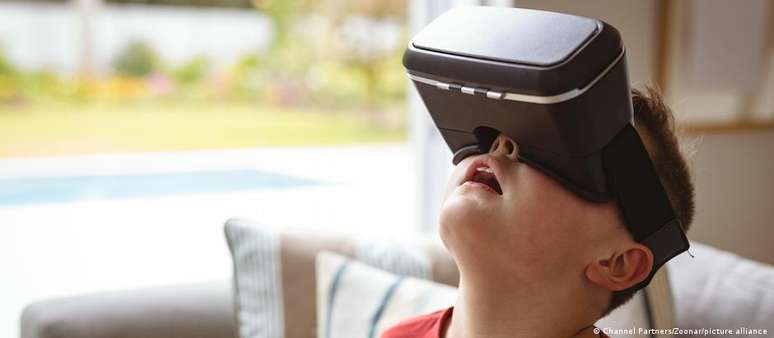Currently, 6% of German children and adolescents are addicted to games and social media. There are 680 thousand cases, double the number before the covid 19 pandemic. Paul is from Berlin, he is 19 and finished high school almost a year ago. His last years of school don’t bring him good memories. “It was a constant lockdown, due to the coronavirus. We were without school for weeks and still had to stay home.” Meeting friends, going for walks, going to parties, playing sports – much of what is important and natural for young people has been taboo for a long time.
“The only thing you could do was stay in your room playing on your computer or smartphone and posting on social media,” says the young man, happy with the end of the restrictions.
For Paul, long back in the real world, the countless hours spent in front of the computer are just a bad memory. Others cannot say the same, having become trapped in the virtual cosmos.
Bucket instead of toilet
According to a long-term study conducted by the Hamburg-Eppendorf University Hospital (UKE) in cooperation with the health insurer DAK-Gesundheit, the number of children and young people who are pathologically addicted to games and social media has doubled in Germany since 2019. 680,000 in the country play, chat, post or watch videos online nearly five hours a day.
For the executive director of DAK-Gesundheit, Andreas Storm, these results are “frightening”: “Unfortunately, the hope that the increase in usage time and the decrease in addiction in recent years has not materialized,” he complains.
The consequences of such behaviors are observed on a daily basis by the psychologist Kai Müller, president of the professional association Medienabhängigkeit, which specializes in media addiction, and which also operates in the outpatient clinic for game addicts at the Mainz University Clinic. This is where desperate parents come to ask for help, who don’t know what else to do with their children who spend every free minute on their computer or cell phone.
They are young people who neglect school and family responsibilities, resist turning off their screens and react with anxiety, intense anger and misunderstanding. Who lock themselves in their rooms, become inaccessible and no longer have hobbies or interests. In extreme cases, they forget to eat and put a bucket in the room so they don’t have to go to the toilet.
Loss of control, priorities, persistence of addiction
According to Müller, the pandemic has been particularly stressful for adolescents, who are psychologically more vulnerable than adults. Therefore, the consumption of games, videos and social networks has often become a “consolation”.
“When the media catches you in a phase of fear, disappointment and doubt, what we in psychology call emotional conditioning can happen.” A bond is created and, logically, this makes us cling to it.
Since the beginning of 2022, computer game addiction has been recognized as a disorder by the World Health Organization (WHO). According to psychologist Kai Müller, there are three basic criteria for the diagnosis. The first is the “loss of control”, i.e. no longer being able to make decisions freely and consciously. “How much do I use anyway, when I don’t use it, for how long and what do I use it?”
The second point is priority. When games or the use of social networks are no longer just a part of life, but dominate practically everything.
“The third criterion is that the use is maintained even after the affected persons have realized that it really causes them problems or is not good for them,” explains Müller.
Gambling addiction is the most common problem
Suffering, however, usually only appears over time. “When young people see that circle of friends who used to play a lot, they start turning to other areas of life, such as first girlfriend or first boyfriend, or other hobbies that have nothing to do with the Internet, but are still glued to gaming This is often the internal trigger that makes those affected stop and think, “Why doesn’t this happen to me?”
“Among those who will ask for help at the gambling addiction clinic in Mainz are 17-year-old boys, for example: “This happens when those affected no longer function, to put it coldly, neither in physical, performance or social terms”. , explains Müller.
Young people learn new things every day. Not only in schools, but also in an interpersonal way. “There’s a whole range of developmental stages, and I see that among young adults who come to us at 25 or 26 biological years, I often get the impression that they look like 15 or 16.”
Boys are much more likely to be addicted to gaming than girls. Social media addiction affects both genders, but is a much less common topic at the Mainz addiction clinic. “The use of social networks is part of society today, it’s in people’s minds,” says Müller, who reckons there is “a high number of unreported cases” among drug addicts in this area.
Excessive use of social media is such a thing that it even becomes the subject of educational campaigns by the German Ministry of Health. The psychologist mentions an ongoing research project aimed at developing new treatment options.
More prevention, more help
In any case, addiction treatment has the best chance of success the earlier doctors and psychologists intervene and before the condition becomes chronic.
“We also have patients whose first symptoms of addiction clearly existed in their youth, but who only sought treatment in adulthood. Some have been hospitalized, but then, in their 30s or older, end up coming back, simply because the problem it doesn’t go far.
Getting a place in therapy, however, is increasingly difficult. In the Mainz outpatient clinic there is a waiting period of three months between the telephone registration and the first consultation with the psychologist. Previously it was two weeks, says Müller: “We are far from having adequate service capacity”, currently patients wait up to six months.
For Andreas Storm, from DAK-Gesundheit, the prevention and care services need to be expanded. “If we don’t act quickly now, more and more children and young people will fall into media addiction and the negative trend can no longer be stopped.”
He sees it as a duty not only of politics, but also of society”. constructive, long-term way for their personal and professional life”.
Even psychologists see it as a task for parents, who must constantly limit the use of digital entertainment programs, especially when it comes to younger children.
Because one thing is certain: computers and smartphones are ubiquitous and the modern world would be inconceivable without them. While abstinence is possible with alcohol or nicotine addiction, with digital addiction relapse is always just a click away.
Source: Terra
Rose James is a Gossipify movie and series reviewer known for her in-depth analysis and unique perspective on the latest releases. With a background in film studies, she provides engaging and informative reviews, and keeps readers up to date with industry trends and emerging talents.




![Such a great sun in advance: Elizabeth’s Terrible Accidental Victims … which Waiting for You Week until August 25, 2025 [SPOILERS] Such a great sun in advance: Elizabeth’s Terrible Accidental Victims … which Waiting for You Week until August 25, 2025 [SPOILERS]](https://fr.web.img6.acsta.net/img/d0/c4/d0c4d9256b5997c98008a65d7a43177e.jpg)

